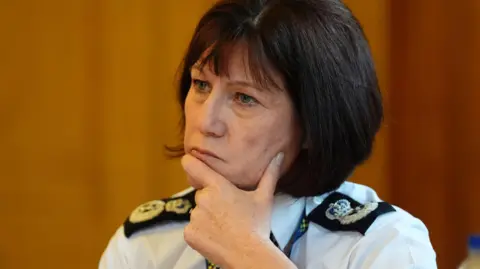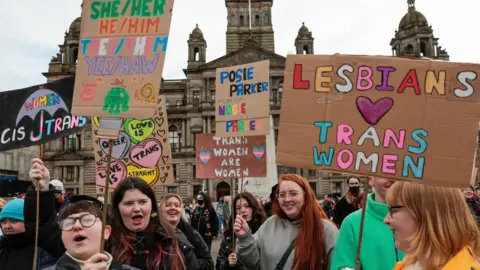Police have no legal framework for gender identity - chief constable
 PA Media
PA MediaThe chief constable of Police Scotland has criticised the Scottish and UK parliaments for failing to set out laws to help public bodies deal with gender identity.
The force had been questioned by MSPs over how it records the gender of rapists.
This prompted Chief Constable Jo Farrell to clarify that male rapists will not be recorded as women.
Ms Farrell told a meeting of the Scottish Police Authority (SPA) - the governing body for the force - that public bodies have been left to develop their own practices in the absence of legal direction that was "consistent with the Equality Act" - meaning it protects both the rights of women and those changing their gender.
The chief constable said a review on police policy and practices on sex and gender would continue, but said the issue was not straightforward.
Ms Farrell told the SPA board that gender self-identification had been "amongst the most emotive and arguably divisive" areas of public policy and practice in recent memory.
She said: "Neither Scottish or UK parliaments have been able to set out a codified approach in legislation to the legal status, rights or duties pertaining to the concept of gender recognition in a way that reconciles with the Equality Act of 2010.
"It is within this context that Police Scotland and other public bodies have determined policy and practice in a way that achieves what we consider to be a legal and appropriate balance of rights and duties."
Recently, Conservative MSP Rachael Hamilton told the Scottish Parliament that she had heard concerns that male rapists could "demand" to be called women - a claim Ms Farrell said was not true.
The chief constable said she understood there was a desire for clarity over the way sex crimes were recorded, saying: "To be clear, a male rapist cannot demand to be called a woman and further traumatise the victim.
"This would not happen and to my knowledge this has never happened."
Ms Farrell added that people who commit serious sexual assaults have their DNA taken to determine their biological sex, and this information can be used for future and historic police investigations.
Police Scotland's policy on recording the gender of rapists was also clarified in a letter to Holyrood's criminal justice committee on Wednesday - which again said there had been an "absence of direction" from the Scottish and UK parliaments.
What led to the police clarification?
 Getty Images
Getty ImagesIn recent years there has been ongoing debate over gender identity in Scotland, largely around the Scottish government's failed attempts to reform the way people can legally change their gender - a bill introduced by Nicola Sturgeon.
This has put public services under pressure to be clearer about the way they deal with issues relating to gender and sex.
The Scottish Prison Service, for example, issued new guidance last year setting out that trans women who have hurt or threatened women or girls will not be held in female prisons unless there are "exceptional" circumstances.
This followed public outcry over the case of Isla Bryson, who was charged with rape as a man called Adam Graham, transitioned while awaiting trial and was sent to a women's prison after conviction - though was kept apart from other inmates.
Bryson was moved to a male wing of HMP Edinburgh two days later.
In April last year the Scottish government's Citizen Participation and Public Petitions Committee asked Police Scotland for an update on whether any biological males had been charged with rape and self-identified as a woman.
In its response, Police Scotland said there were circumstances where women could be recorded as having committed a rape.
This was true if a new record had been created for a first time offender where the attending officer was satisfied that they "present as female".
The correspondence also said that there were no instances on record of a man carrying out a sexual assault and then being classed as a woman.
It added that no women suspected or accused of involvement in rape at that time had involvement in the physical act itself - all of those cases were connected with someone aiding or abetting the crime.
The BBC understands Police Scotland believes its past language on the matter has not been helpful as it left the decision-making to the judgement of individual officers.
'U-turn' claim
Police Scotland's clarification on the gender of rapists has been called a "major U-turn" by an research group Murray Blackburn Mackenzie - which analyses public policy around women's sex-based rights.
Murray Blackburn Mackenzie has repeatedly criticised the Scottish government's gender reforms.
The Edinburgh group said it was "an extraordinary act of institutional gaslighting" to pretend the letter was not a significant policy change from their previous position.
They claim that Police Scotland persistently defended the use of self-ID for recording the sex of all offenders, including sex offenders.
They say the police claim that a rapist self-identifying as a woman would not happen is contradictory to previous advice - which said that a person would be recorded as female if they had a gender recognition certificate.
Ms Farrell, who took over the role last year, told the SPA that she had been "struck by commentary from some quarters" that police, under her leadership, were perpetuating a policy that was "misogynistic".
"I have spent my entire career of more than 30 years in policing facing and challenging misogyny while supporting the rights of women," she said.
She said everybody should be able to speak to police knowing they would be treated with dignity and respect - and that these values had not always been applied to the LGBTQI+ community in Scotland.
Ms Farrell said she wanted to build a service that was inclusive and respected the diversity and rights of all individuals.
